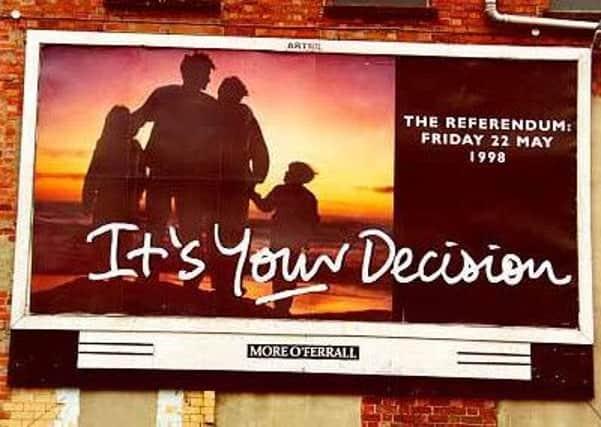Belfast Agreement's promise of consent broken by PM's Brexit deal


The key point is that, unlike any other trade treaty in the world, it contains no notice clause allowing each party to withdraw.
Instead, the UK can only stop the Protocol coming into force after the end of the two or possibly four year transition period, if the EU does a trade agreement with us which replaces it. And once it has come into force, we are locked into it until such time as the EU agrees (in its judgement, not ours) that the Protocol is no longer necessary.
Advertisement
Hide AdAdvertisement
Hide AdThe whole of the UK will stay in a Customs Union with the EU. The UK will be obliged to follow the EU’s tariffs at all times, but will have no vote on those tariffs and will be prevented from doing trade deals of our own.


It also obliges the UK not to deviate from EU rules on so‑called “level playing field” areas of policy, including environment, workplace rights, state aid and competition law.
Secondly, it will require Northern Ireland (unlike Great Britain) to be subject to a large number of EU Single Market regulations and directives, together with EU customs and tax rules. The titles of these measures cover 68 pages in Annex 5.
The EU can amend these laws in future which will then apply as amended in Northern Ireland, with neither the UK Parliament nor the Northern Ireland Assembly having a vote on the changes. These EU laws will have direct effect and supremacy over UK law, be subject to enforcement by the EU Commission, and be interpreted by the European Court of Justice in Luxembourg whose rulings will be supreme over our courts.
Advertisement
Hide AdAdvertisement
Hide AdThe Protocol requires controls against the movement of goods from Great Britain into Northern Ireland to check if those goods comply with EU laws and certification procedures.
These controls will mean that Northern Ireland consumers will not get the same benefits as consumers in Great Britain. Northern Ireland businesses and farmers will need to compete in Great Britain, their biggest export market, hobbled by EU rules which do not apply to their mainland competitors.
The UK was founded on the creation of a unified internal market.
The 1800 Articles of Union between Great Britain and Ireland say that “in all treaties with any foreign power, his Majesty’s subjects of Ireland shall have same the privileges, and be on the same footing as his Majesty’s subjects of Great Britain.”
Advertisement
Hide AdAdvertisement
Hide AdAll prohibitions on the export of products of Great Britain to Ireland or vice versa were abolished from January 1, 1801.
The Protocol would over-ride both of these provisions.
So it would alter the constitutional status of Northern Ireland without the consent of the people, contrary to Article 1(iii) of the Belfast Agreement.
Mrs May claims that the Political Declaration she has negotiated with EU leaders gives the UK the trade deal it wants and means that the EU has agreed that the ‘backstop’ can be replaced with “alternative arrangements” for managing the land border using “facilitative arrangements and technology”.
In fact, the actual words of the declaration merely say that such alternatives will be “considered”. The EU can politely turn round later and say it has “considered” these alternatives but finds them wanting and will not agree to them.
Advertisement
Hide AdAdvertisement
Hide AdOn the other hand, the Withdrawal Agreement itself and the Protocol are legally binding.
It will be highly attractive to the EU to push the UK into the backstop since that gives EU exporters continued tariff-free access into the UK market for their £95bn per year surplus of goods trade, and it forces the UK to lock out competing goods from other countries.
In addition, each individual EU member state will have a legal veto against the UK climbing out of the backstop.
As President Macron announced on Sunday, France will use its veto to lock the UK into the backstop until the UK agrees to give France what it wants on access to fishing waters. Spain will impose its veto unless its demands over Gibraltar are met.
Advertisement
Hide AdAdvertisement
Hide AdBecause we are legally locked in to the Protocol and cannot escape without the EU’s consent, we will have destroyed our negotiating power in advance.
The EU will have the Protocol – with its guillotine across the UK – to bring down on us if we do not agree to the same terms or worse in any replacement trade agreement.
• Martin Howe QC has been a practicing barrister since 1978 and a QC since 1996; based in London, he specialises in intellectual property and European law.
He is chairman of Lawyers for Britain, a group of lawyers, legal academics, retired judges and constitutional specialists who have come together to “support the British people’s decision to leave the EU”. This article is based on fuller articles which Mr Howe has published on www.lawyersforbritain.org